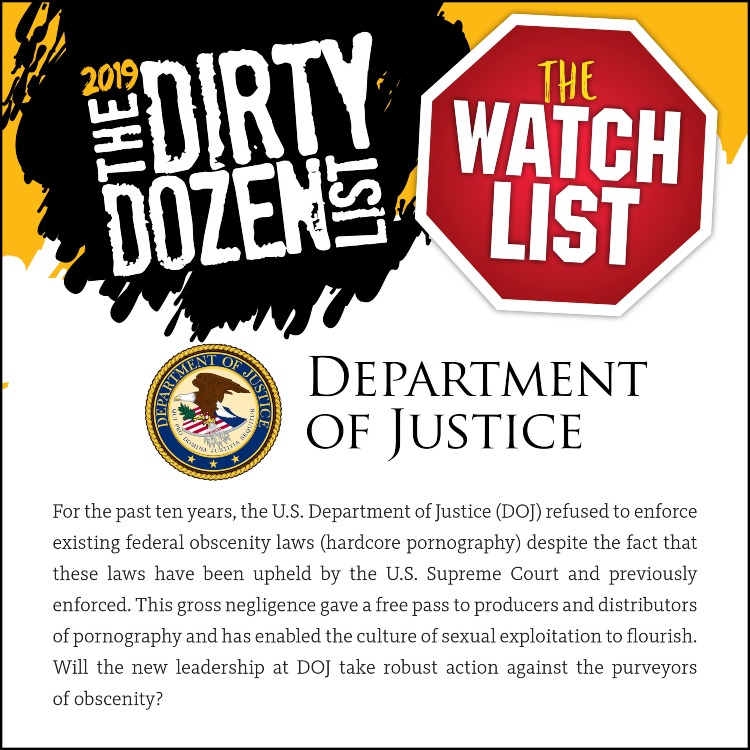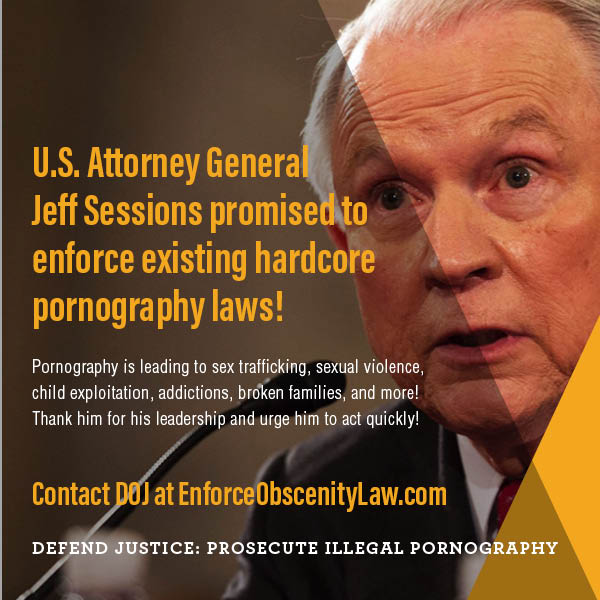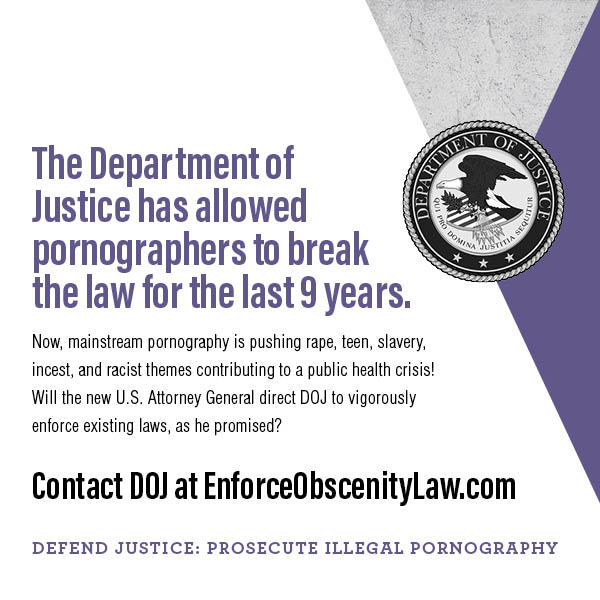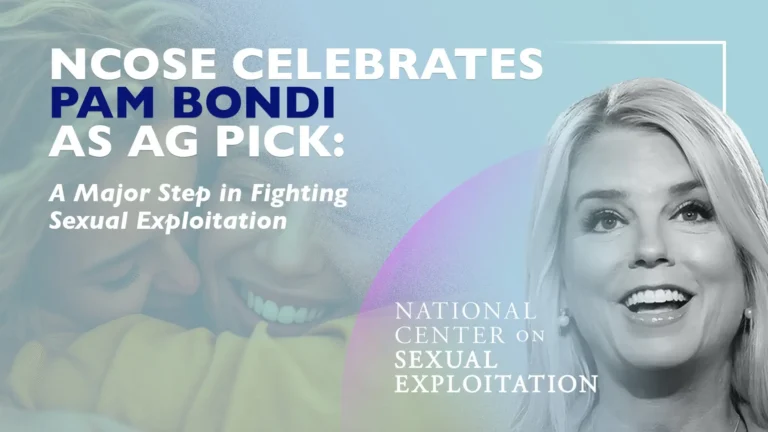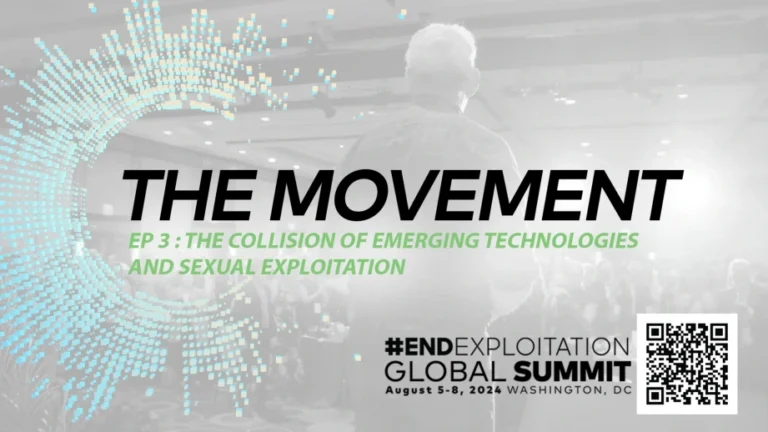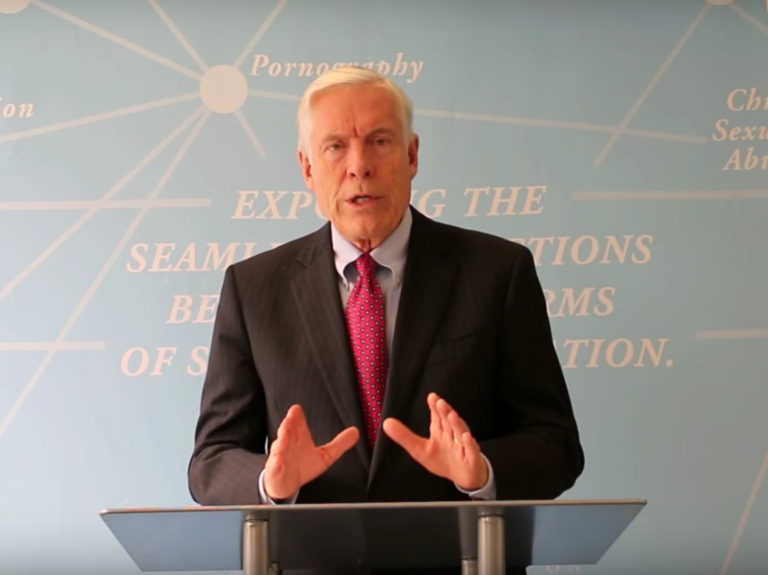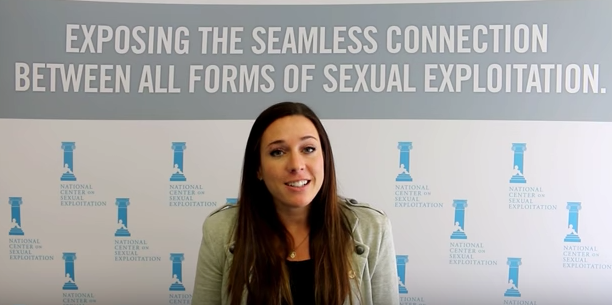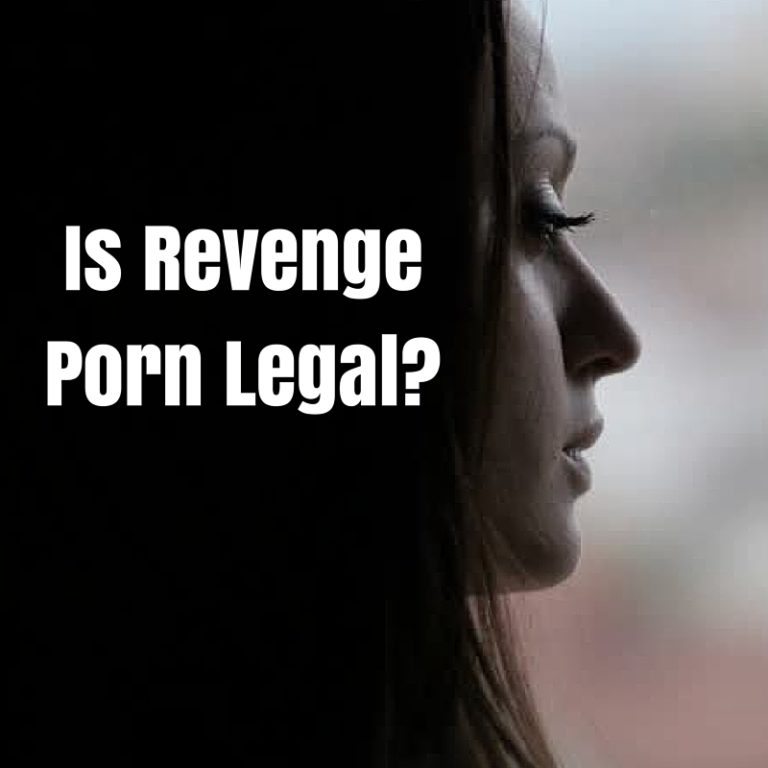
The Problem
It is time for the U.S. Department of Justice to enforce existing federal laws against illegal pornography distributors and producers.
Most people are shocked to discover that Federal law prohibits the distribution of obscene adult pornography on the Internet, on cable/satellite TV, on hotel/motel TV, in retail shops, through the mail, and by common carrier.
The U.S. Supreme Court has repeatedly upheld obscenity laws against First Amendment challenges, explaining that obscenity is not protected speech, similar to other forms of unprotected speech like blackmail, defamation, or child pornography.
Even so, the U.S. Department of Justice (DOJ) refuses to enforce existing federal obscenity laws. Prosecution of obscenity declined drastically under Presidents Bill Clinton and George W. Bush and then halted completely under President Barrack Obama when in 2011 former Attorney General Eric Holder dismantled the Obscenity Prosecution Task Force.
Because obscenity laws have not been enforced, we have seen a dramatic rise in illegal pornography production and distribution in the last decade.
Hotels, and cable and TV companies, and of course Internet pornography distributors, regularly sell pornography with themes including teenagers, incest, rape, sexual slavery, and extreme violence.
It is time to uphold the rule of law, and stop illegal pornography distribution.
Contrary to popularly held beliefs, obscenity (most hardcore pornography) is not protected Free Speech. In fact, federal obscenity laws, which are not being enforced, prohibit distribution of hardcore, obscene pornography on the Internet, on cable/satellite or hotel/motel TV and in sexually oriented businesses and other retail shops.
Enforcement of obscenity laws does not raise Constitutional problem – In Chaplinksy v. New Hampshire, 315 U.S. 568, 571-572 (1942), the Supreme Court said: “There are certain well-defined and narrowly limited classes of speech, the prevention and punishment of which have never been thought to raise any Constitutional problem. These include the lewd and obscene…It has been well observed that such utterances are no essential part of any exposition of ideas, and are of such slight social value as a step to truth that any benefit that may be derived from them is clearly outweighed by the social interest in order and morality.
Obscenity is not within the area of constitutionally protected speech or press – In Roth v. United States, 354 U.S. 476 (1957), Justice Brennan observed that “this Court has always assumed that obscenity is not protected by the freedoms of speech and press” (at 481). In Roth, the Supreme Court went on to hold that obscenity is “not within the area of constitutionally protected speech or press” (at 485).
First Amendment was intended to protect ideas and debate, not obscene material – In Miller v. California, 413 U.S. 15, 34 (1973), the Supreme Court said: “[T]o equate the free and robust exchange of ideas and political debate with commercial exploitation of obscene material demeans the grand conception of the First Amendment and its high purposes in the historic struggle for freedom. It is a ‘misuse of the great guarantees of free speech and…press.’”
More recently, in Ashcroft v. ACLU, 535 U.S. 564!(2002), the Supreme Court rejected a constitutional challenge to application of obscenity laws to the Internet. See also, United States v. Extreme Associates, 431 F.3d 150 (3rd Cir. 2005), cert. den., 547 U.S. 1143 (2006).
In Paris Adult Theater I v. Slaton, 413 U.S. 49, 57 (1973), the Supreme Court identified “legitimate governmental interests” that justify a prohibition on obscene materials “even if it is feasible to enforce eðective safeguards against exposure to juveniles.” These include protecting the community environment, public safety, morality and family life. The Court also said there is a “right of the Nation and of the states to maintain a decent society” (at 59).
The display of pornography is also a frequent factor in workplace sexual harassment cases, and time wasted viewing pornography reduces worker productivity. Our nation’s role in polluting the world with pornography is also making the war against terrorism more difficult. Common sense should also inform us that when children are exposed to graphic depictions of hardcore adult pornography their attitudes about sex, sexual desires and sexual behavior can be influenced for the worst. And especially on the Internet, large numbers of children are being exposed to hardcore adult pornography.
According to the results of a national opinion poll commissioned by Morality in Media and conducted by Harris Interactive in April 2008: 75% of adult Americans said they would support the next President were he to do all in his or constitutional power to ensure that federal obscenity laws are enforced vigorously.
Definition of Pornography:
The term “pornography” is a generic, not a legal term. As noted by the Supreme Court in the landmark 1973 obscenity case, Miller v. California, 413 U.S. 15, 20, n.2, the term “pornography” derives from the Greek (harlot, and graphos, writing). The word now means “1: a description of prostitutes or prostitution 2. a depiction (as in a writing or painting) of licentiousness or lewdness: a portrayal of erotic behavior designed to cause sexual excitement.” (Webster’s Third New International Dictionary [Unabridged 1969])
Definition of Obscenity:
The term “obscenity” is a legal term, and in Miller v. California, the Supreme Court established a three-pronged test for determining whether a “work” (i.e., material or a performance) is obscene and therefore unprotected by the First Amendment. To be obscene, a judge and/or a jury must determine: First, that the average person, applying contemporary community standards, would find that the work, taken as a whole, appeals to the prurient interest; AND second, that the work depicts or describes in a patently offensive way, as measured by contemporary community standards, “hardcore” sexual conduct specifically defined by the applicable law; AND third, that a reasonable person would find that the work, taken as a whole, lacks serious literary, artistic, political and scientific value. (NOTE: Typical “hardcore pornography” [e.g., a website, DVD or magazine] consists of little if anything more than one depiction of hardcore sex after the other [i.e., it’s “wall-to-wall” sex].)
In the 1980s, the United States Department of Justice first began to prosecute violations of federal obscenity laws.
When obscenity laws were enforced, pornographers in many parts of the country responded by self-regulating, avoiding extremely violent or degrading content, and pulling potentially illegal material off their shelves.
Yet, largely spurred by former Attorney General Eric Holder alongside systemic cultural shifts within the DOJ, obscenity law prosecutions ceased. Eric Holder was placed on NCOSE’s Dirty Dozen List in 2013 and 2014, and in 2015 the Department of Justice was named for its failure to enforce the law.
Illegal Pornography is Pervasive, Degrading, and Harmful.
Companies like BangBros, Kink.com, Naughty America, Reality Kings, Wicked Pictures, Vivid Entertainment, and dozens more, openly produce hardcore, adult pornography. Countless Internet websites make this material accessible to homes, schools, libraries, businesses, and government offices[1] across the country.
In an age when our society is struggling to deal with serious child and adult sexual exploitation,[2] racially motivated sexual violence,[3] an epidemic of sexual assault on college and university campuses,[4] thousands of young women and girls are being trafficked for purposes of prostitution,[5] Department of Justice employees must be admonished to not engage in purchase of sex from prostituting persons,[6] child sexual abuse is 167 times more common than autism in children,[7] and 81.2% of childhood sexual abuse cases are perpetrated by parents,[8] adult, hardcore pornography only serves to exacerbate deeply entrenched social ills that have devastating impacts at the individual and societal level. It is long past time for the producers and distributors of this sexually toxic material to face justice.
It is long past time for the producers and distributors of this sexually toxic material to face justice.
A wealth of peer-reviewed research demonstrates the many harms of pornography. For instance, a growing body of neuroscience reveals that adults are developing addictions to pornography, as pornography hijacks the brain’s reward center in a way similar to drug addiction.[9] Moreover, an alarming, nationally representative online survey of 3,000 people reveals that nearly half of young people (ages 13-24) actively seek out pornography weekly or more often.[10] This is especially troubling given that research into how the human brain develops shows that adolescents are not as readily able to access their frontal lobes—the portion of the brain that controls impulses and allows for rapid, smart decision making.[11] Furthermore, adolescents are more susceptible to forming addictions than adults because the dopamine neurons in their nucleus accumbens (i.e. the brain’s pleasure center) are much more active and have an exaggerated plasticity in response to an addictive stimulus.[12] Thus, it can be said that a propensity for addiction is more strongly “hardwired” into the adolescent brain.[13]
Additionally, sexual violence against women, including sexual harassment and rape, are correlated to the consumption of pornography.
A recent meta-analysis of 22 studies from seven countries provides clear evidence confirming that pornography exposure is associated with sexual aggression in the United States and internationally, among both males and females; associations are stronger for verbal than physical sexual aggression, but both are significant.[14] As the authors state, “the accumulated data leave little doubt that, on the average, individuals who consume pornography more frequently are more likely to hold attitudes conducive to sexual aggression and engage in actual acts of sexual aggression than individuals who do not consume pornography or who consume pornography less frequently.”[15]
A separate meta-analysis of 46 studies demonstrated that pornography contributes to the development of sexually dysfunctional attitudes and behaviors including:
- developing sexual deviant tendencies,
- committing sexual offenses,
- experiencing difficulties in intimate relationships, and
- accepting rape myths.[16]
Further, older adolescents who use pornography are more likely to be attracted to 13 or 14 year olds,[17] and the earlier college men were exposed to pornography the more likely they are to have engaged in nonconsensual sex.[18] Fraternity men who consume mainstream pornography express a greater intent to commit rape; those who consume sadomasochistic pornography express significantly less willingness to intervene in situations of sexual violence, greater beliefs in rape myths, and greater intent to commit rape; and, among those who consume rape-themed pornography, the researchers described “serious effects” including less bystander willingness to intervene, greater belief in rape myth, and greater intent to commit rape.[19] In other words, there was no type of pornography that did not result in a greater intent to commit rape.
We also have testimonials from former pornography performers who report being exploited, given illicit drugs, coerced to perform objectionable acts, and raped, thus constituting sex trafficking under the U.S. Trafficking Victims Projection Act.
All girls, boys, women, and men have a natural human dignity and thus a right to live lives free from sexual exploitation.
Our nation is now suffering from an emerging public health crisis fueled by the widespread distribution of adult, hardcore pornography, and the Department of Justice bears a great burden of responsibility for this crisis.
[1] We note that this has been a problem for federal agencies such as the Environmental Protection Agency, the Missile Defense Agency, the Securities and Exchange Commission, etc. See: http://dailycaller.com/2015/04/30/epa-employees-watched-porn-harassed-women-and-got-promoted/ and http://fellowshipoftheminds.com/2012/08/22/federal-employees-watch-child-porn-on-govt-computers/ (accessed January 14, 2016).
[2] Bryce Covert, “Women in Baltimore Public Housing Were Forced to Trade Sex for Basic Repairs.” Think Progress (Jan 9, 2016), http://thinkprogress.org/economy/2016/01/09/3737612/baltimore-housing-sex-settlement/ (accessed January 9, 2016); U.S. Department of Justice. “The National Strategy for Child Exploitation Prevention and Interdiction: A Report to Congress, (August 2010), http://www.justice.gov/psc/docs/natstrategyreport.pdf (accessed January 14, 2016).
[3] Victoria Olive, “Sexual Assault against Women of Color.” Journal of Student Research 1 (2012): 1-19; Gabby Bess, “Notre Dame Tutor Accused of Forcing Student into ‘Racially Motivated’ Sex.” Broadly, (November 2, 2015), https://broadly.vice.com/en_us/article/notre-dame-tutor-accused-of-forcing-student-into-racially-motivated-sex (accessed January 14, 2016); Donna M. Hughes, “’Welcome to Rape Camp’ Sexual Exploitation and the Internet in Cambodia.” Journal of Sexual Aggression 6, no. 1/2 (2000):1-23, http://www.uri.edu/artsci/wms/hughes/rapecamp.htm (accessed January 14, 2016).
[4] The White House Council on Women and Girls. Rape and Sexual Assault: A Renewed Call to Action, (2014), https://www.whitehouse.gov/sites/default/files/docs/sexual_assault_report_1-21-14.pdf (accessed January 9, 2016).
[5] Polaris. 2014 Statistics, https://polarisproject.org/sites/default/files/2014Statistics.pdf (accessed January 9, 2016).
[6] Adam Lerner, “Holder’s Friday Memo to DOJ Staff: Don’t Hire Prostitutes.” Politico, April 10, 2015, http://www.politico.com/story/2015/04/eric-holder-prostitution-memo-116865 (accessed January 14, 2016).
[7] National Coalition to Prevent Child Sexual Abuse and Exploitation. The Health Impact on Children & Youth. http://www.preventtogether.org/Resources/Documents/Health_Impact_on_Youth.pdf (accessed January 9, 2016).
[8] U.S. Department of Health and Human Services, Administration for Children and Families, Administration on Children, Youth and Families. Children’s Bureau. Child Maltreatment, 2010. Data Source for CM 2010 Table 5-5 Perpetrators by Relationship to Victims 2010. http://www.acf.hhs.gov/programs/cb/resource/child-maltreatment-2010-data-tables (accessed January 9, 2016).
[9] Simone Kühn and Jürgen Gallinat, “Brain Structure and Functional Connectivity Associated with Pornography Consumption: The Brain on Porn,” JAMA Psychiatry 71, no. 7 (2014): 827-834. Ji-Woo Seok and Jin-Hun Sohn, “Neural Substrates of Sexual Desire in Individuals with Problematic Hypersexual Behavior,” Frontiers in Behavioral Neuroscience, (November 30, 2015). ). Porn Study Critiques, “Current List of Brain Studies on Porn Users, (September 29, 2015) http://pornstudycritiques.com/current-list-of-brain-studies-on-porn-users/ (accessed January 28, 2016).
[10] Barna Group, “The Porn Phenomenon: A Comprehensive New Survey on Americans, the Church, and Pornography,” (2016).
[11] Frances E. Jensen with Amy Ellis Nutt, The Teenage Brain: A Neuroscientist’s Survival Guild to Raising Adolescents and Young Adults, (New York: Harper Collins, 2015).
[12] Ibid.
[13] Ibid.
[14] Paul J. Wright, Robert S. Tokunaga, and Ashley Kraus. “A Meta-Analysis of Pornography Consumption and Actual Acts of Sexual Aggression in General Population Studies.” Journal of Communications, (December 29, 2015): 1-23.
[15] Ibid.
[16] Elizabeth Paolucci-Oddone, Mark Genuis, and Claudio Violato, “A Meta-Analysis of the Published Research on the Effects of Pornography. In C. Violato, E. Paolucci-Oddone, & M. Genius (Eds). The Changing Family and Child Development (Aldershot, England: Ashgate Publishing), 2000: 48-59.
[17] Kristinn Henga, Svein Mossige, and Lars Wichstrom, “Older Adolescents’ Positive Attitudes toward Younger Adolescents as Sexual Partners,” Adolescence 39, no. 156, (2004): 627-651.
[18] Mary Anne Layden, unpublished data, 2015.
[19] John Foubert, Matt Brosi, and R. Bannon, “Pornography Viewing among Fraternity Men: Effects on Bystander Intervention, Rape Myth Acceptance & Behavioral Intent to Commit Sexual Assault, Sexual Addiction & Compulsivity, 18, no. 4 (2011): 212-231.
WARNING: There are graphic images and text descriptions shown in these sections.
POSSIBLE TRIGGER.
Proof
Take Action
Pressure the DOJ to Enforce Obscenity Law
Public Health Harms of Pornography
Tell DOJ to Investigate SeekingArrangement
Help educate others and demand change by sharing these on social media:
Progress

In 2024, you made several major corporations safer, including Meta, Google, Apple, Snapchat, and more!
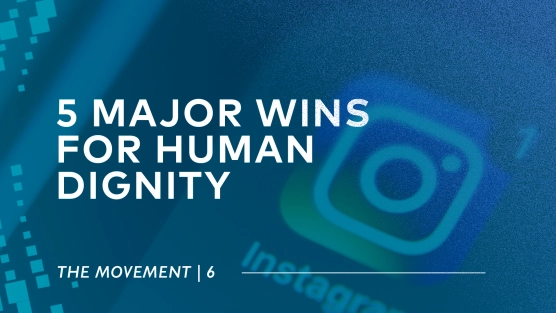
Read the latest progress and updates in the fight against sexual exploitation!
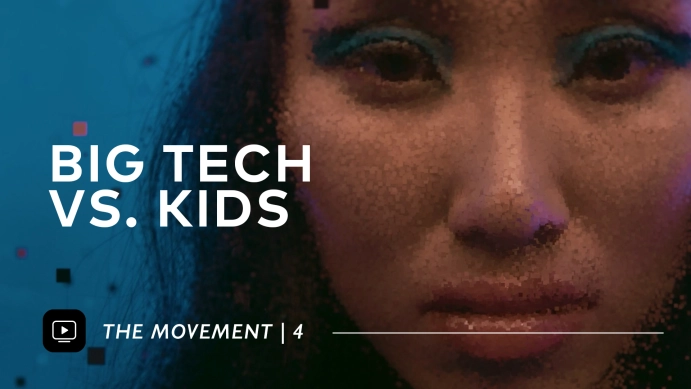
Thanks to YOU taking action, many Big Tech companies are taking concrete steps to protect kids online!

